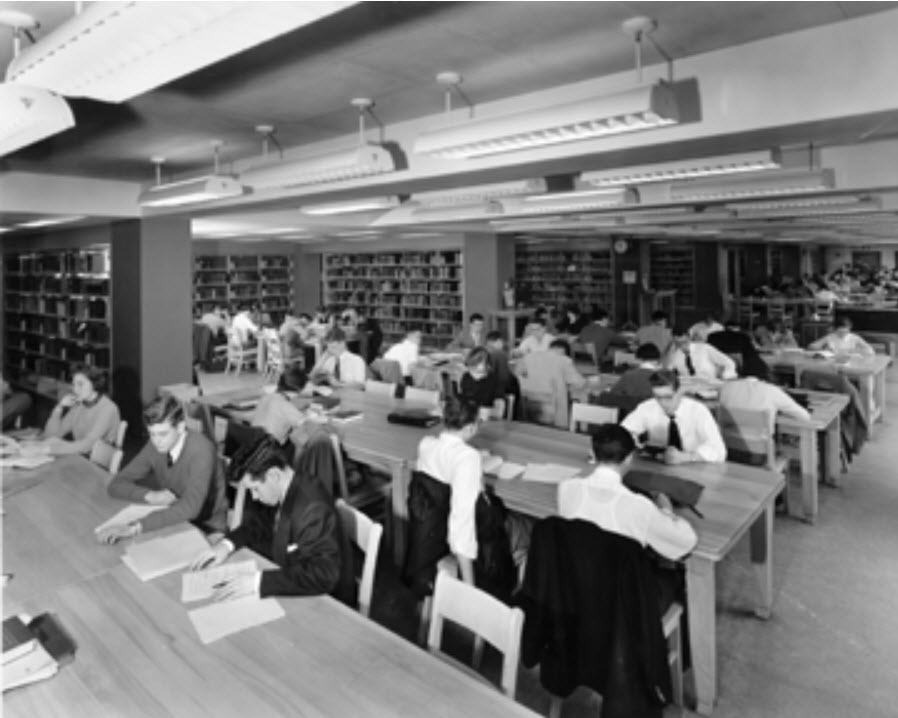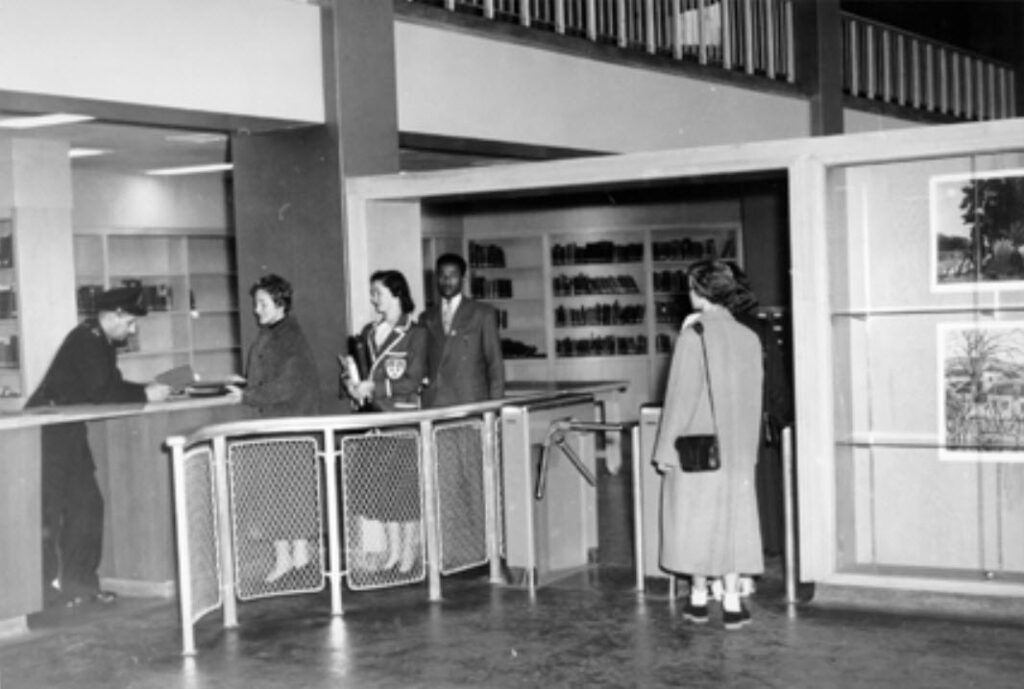To ring out McGill’s Bicentennial, the Library is featuring an Unsung Hero of yore. On January 7th, 1974, Miss Martha McCallum, Gift and Exchange Clerk, celebrated her 50th anniversary as an employee of McGill University Libraries….Miss McCallum received a letter from Dr. Bell, Principal and Vice Chancellor. Quoting from this letter Dr. Bell writes, “I would like to congratulate you most heartily on this remarkable record of service, which must be almost unequalled in the university.” The following quote was found in a letter received from Dr. Farley, Director of Libraries, on the day of the anniversary, “It is comforting for an administrator to realize that sometimes experienced staff can find their jobs interesting enough to stay on for a long period of time.” On January 7, 1924, Miss McCallum was met at the door of the Redpath Library by the Building Janitor on this first day at work, to be advised in a very unpleasant manner, that this was a terrible place to work and that she would not last one month. Miss McCallum’s reply – “I expect to achieve the longest service record of anyone in the history of McGill University.”
– written by George McCubbin, Acquisitions Department, Library News, February 1974
Below is an interview with Miss McCallum that appeared in the same edition of Library News. Read a testimonial by Martha to learn more about the history of the Library’s people, services and spaces.
As I celebrate my fiftieth anniversary as a member of the Library Staff, I have been asked to answer the following questions:
What would motivate a young girl to come and work for the McGill Library in the 1920’s?
The Head of each Department of the Library had a Junior Assistant. These Junior Assistants were teen-aged girls who were very carefully selected to fill these posts. It was considered a great honour and privilege to be appointed to the Library Staff, it was a highly suitable environment for a young girl, and it was a wonderful opportunity to obtain a good education. We were given courses in the Extension Department of McGill University and, by taking several courses each session, we· were able to acquire most of the knowledge which a regular B.A. course would have provided.
What was your very first position?
I was appointed to the staff as a junior assistant in the Circulation Department. This work consisted of shelving books in the stack, charging and discharging books borrowed and returned by readers, helping students to find the books they required, and similar duties. After serving four years in the Circulation Department, I was promoted to the Presentation Department, where I assisted Miss Florence L. Clements until her retirement twenty years later. After her retirement, I continued alone in the department which eventually became the Gifts and Ex~hanges Section of the Acquisitions Department.
Were there any men on the staff, aside from the Director?
In addition to the University Librarian, there was one man on the staff. He assisted the University Librarian in setting out exhibits in the Library Museum, attended to the ordering of stationery and other supplies, and made himself generally useful. Across the years, there was always one man on the staff and sometimes two or three. For several years, the University Librarian’s Secretary was a man.
What was the relationship between the Redpath Library and the campus libraries?
Each of the Campus Librarians reported periodically to the University Librarian and carried out their work in accordance with his instructions. They were all part of the library staff and were included in all staff activities.
Did world events such as the Depression and the Second World War penetrate the Library in any visible fashion?
The Depression caused a cut-down in expenditure for all aspects of the Library work, and our salaries were decreased by twenty percent. During the Second World War, with troops drilling on the campus and using some parts of the building, the peace and quiet of the Library was greatly disturbed. The Library was used as a collection centre for “Books for Britain” and the entire staff was deeply involved in aiding the war effort in every way possible.
What do you see as high points and low points in the Library’s development over the past fifty years?
The high points were the building and opening of the addition to the Redpath Library in 1953 and the McLennan Library in 1969. The low point was during the 1950’s when the Library was extremely overcrowded and our working conditions were very uncomfortable.
Can you single out any decade as being more dramatic than another?
The nineteen-sixties, when there were many changes made in the whole library system.
What were the most exciting/unusual gifts that you can recall?
The most exciting gift was the holograph manuscript of John Buchan’s book Augustus, which the author, Lord Tweedsmuir, presented to us when he was Governor-General of Canada.
Among the unusual gifts, I recall a piece of wallpaper from Napoleon’s room at Elba, a water bottle picked up on the field of Waterloo after the battle, some pressed flowers from the grave of Sir Henry Havelock, a Javanese sarong, and many other rare items.
There have been many very large collections, such as the Francis McLennan Collection, the Harold M. Morgan Collection, the Sir Edward Beatty Collection, the Thomas Greenshields Henderson Collection. The largest collection I have handled consisted of nineteen thousand titles, chiefly scientific pamphlets, which came to us from the Estate of Dr. Arthur Willey, a former Head of the Zoology Department.
Did you ever think of becoming a librarian?
No. When I started, there was no degree in Library Science. Librarians were people who had completed a six weeks course in the Summer Library School. Later, when the Library School was organized, we attended special lectures and each year a student.was assigned to us for practice work. My work did not require a full-time course in librarianship.
Looking back over the Directors who have guided the Library in the past fifty years~ did any of them strike you as particularly interesting?
I have served under five Directors – Dr. G.R. Lomer, Mr. Richard Pennington, Mr. John Archer, Mr. Keith Crouch, and Dr. Richard A. Farley. I was·very closely associated with Dr. Lomer and, consequently, I was deeply impressed by his administration.
Do you have beliefs as to why the Library has never had a woman Director?
I suppose it is because the gentlemen who have served in this capacity have done such outstanding work that there was no need to replace them by a woman.
Do you think it would have made any difference in its development?
No. If a job is well done, it makes no difference whether it is done by a man or a woman.
















Leave a Reply
You must be logged in to post a comment.